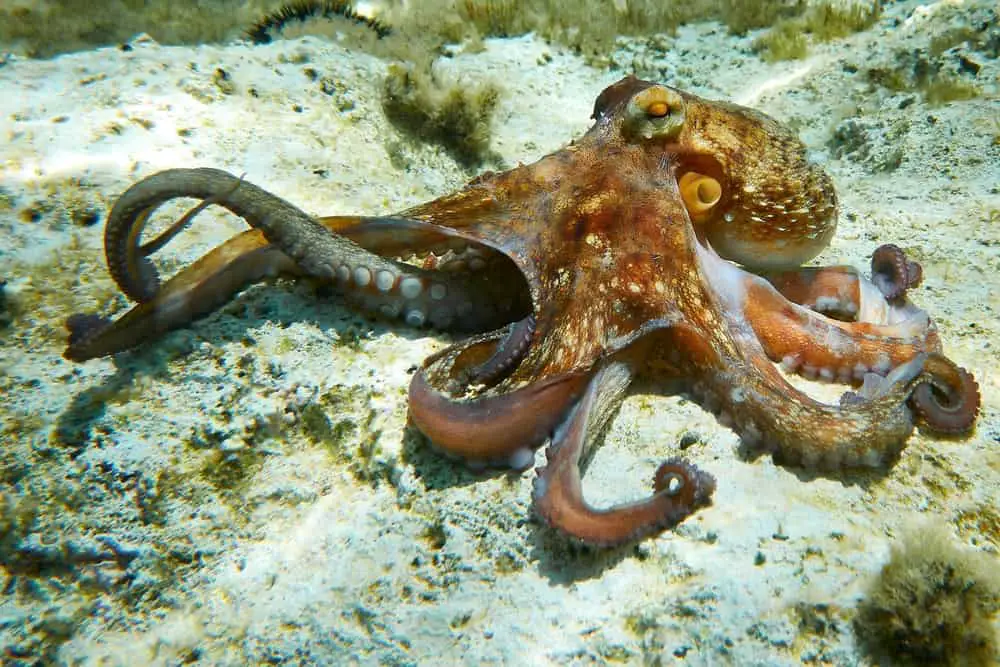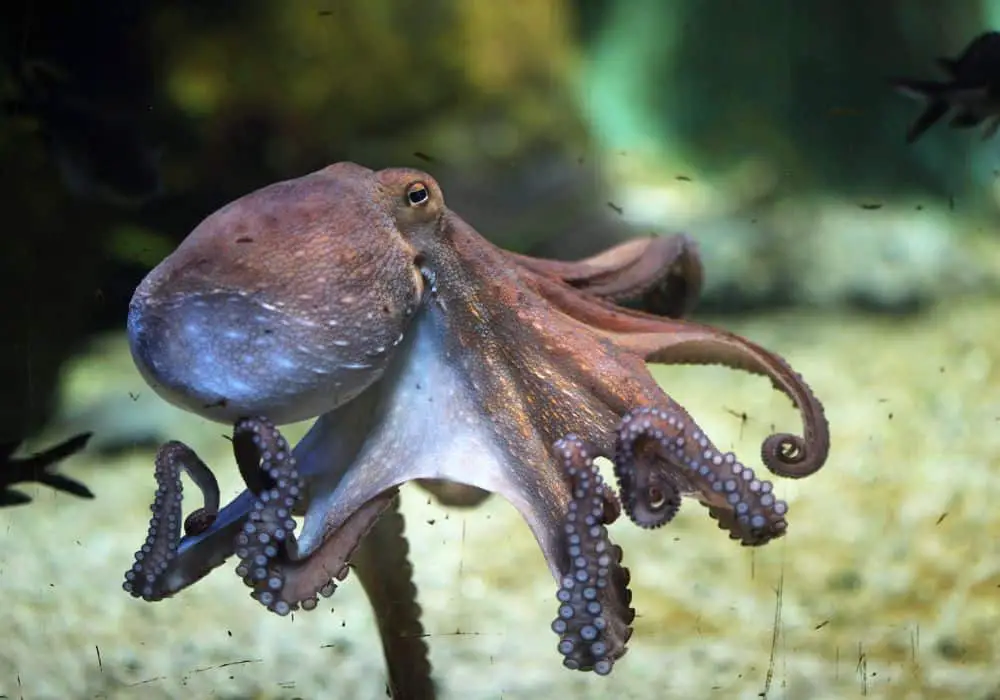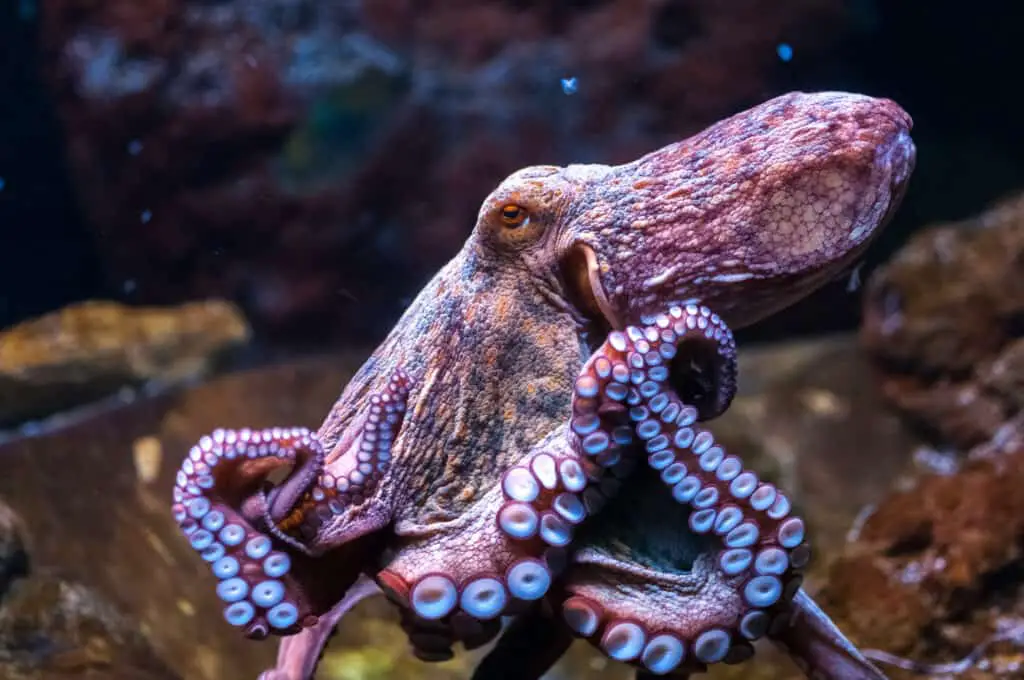What Do Octopuses Symbolize

Introduction
What Do Octopuses Symbolize: Octopuses, those enigmatic creatures of the deep, have captured the human imagination for centuries. Beyond their intriguing biology and remarkable abilities, octopuses hold a symbolic significance that resonates across various cultures and contexts.
One of the primary symbols associated with octopuses is adaptability. Their fluid movements, shape-shifting abilities, and problem-solving skills have long fascinated observers. Octopuses adapt effortlessly to their ever-changing environments, reflecting the idea that flexibility and resilience are valuable traits in our own lives.
Intelligence is another key symbol tied to octopuses live. Their complex behaviors, ability to use tools, and impressive problem-solving capabilities challenge our understanding of animal cognition. As symbols of intelligence, octopuses inspire us to explore the depths of our own minds and the mysteries of the universe.
Octopuses are also emblematic of mystery and the unknown. Their habitat in the deep sea remains one of the least explored and understood regions on Earth. This mystery reminds us of the vast realms of knowledge and experience yet to be uncovered.
Octopuses symbolize the profound connection between nature’s wonders and our understanding of the ocean’s depths. They highlight the importance of marine conservation and the need to protect the fragile ecosystems they inhabit.

What is significant about the octopus?
Octopuses are standouts among cephalopods, and among all invertebrates, for their large brains. They can navigate mazes, solve problems, remember, predict, use tools and take apart just about anything from a crab to a lock—all but that last one sophisticated hunting behaviors.
The octopus, a remarkable marine creature, holds significant importance in several aspects of biology, ecology, culture, and symbolism. One of the most significant features of the octopus is its incredible intelligence. These cephalopods possess a highly developed nervous system and complex problem-solving abilities. Their ability to navigate mazes, open jars, and mimic other creatures highlights their remarkable cognitive prowess. This intelligence has led to a growing interest in studying octopuses to better understand the evolution of intelligence in the animal kingdom.
Octopuses are also significant in marine ecosystems. They are skilled hunters, regulating populations of prey species and helping maintain the balance of marine food webs. Their adaptability to different habitats and their role as both predator and prey make them crucial components of ocean ecosystems.
Moreover, octopuses have cultural and symbolic significance worldwide. In various cultures, they symbolize adaptability, mystery, transformation, and intelligence. Their presence in folklore and mythology often represents the enigmatic and unknown aspects of life and the oceans.
Octopuses are significant in culinary traditions, particularly in countries like Japan, where they are considered a delicacy. Their unique flavor and texture make them a prized ingredient in various dishes.
What does the octopus symbolize evil?
Since the 19th century, the motif of an octopus on propaganda maps has represented the inhuman spread of evil, its tentacles grasping for land and power.
The octopus is not commonly associated with symbolism related to evil in most cultures or traditions. Instead, the octopus tends to be symbolically neutral or even positive in many contexts. However, there are instances where the octopus has been portrayed in a more sinister or negative light, but these interpretations are relatively rare and often rooted in specific cultural or artistic representations.
One possible reason for this less common association with evil could be the octopus’s natural characteristics. Octopuses are typically seen as mysterious, intelligent, and adaptable creatures of the sea. These qualities are more likely to inspire fascination or curiosity rather than fear or negativity.
In some artistic or literary works, the octopus may be used as a symbol of danger or chaos, primarily because of its ability to change its shape and camouflage itself. This shape-shifting quality can be seen as a metaphor for deception or unpredictability.
Overall, while there may be instances where the octopus is symbolically linked to themes of danger or evil, these interpretations are exceptions rather than the rule. In most cultures and contexts, the octopus is more commonly associated with traits like adaptability, intelligence, mystery, and wonder of the natural world.
What does an octopus symbolize in a dream?
In the arena of dream interpretation it’s commonly believed that if you dream about an octopus, it could represent some bad luck, and that someone may be preventing you from reaching your goals. The belief is that such people will try to steer you off course in life and bring turbulence and chaos to your life.
Dreams are windows into the subconscious, often filled with symbols that hold deeper meanings. When an octopus makes an appearance in a dream, it carries significant symbolism. This enigmatic creature, with its eight sinuous arms and intelligent demeanor, embodies various interpretations.
The octopus in a dream may represent adaptability and flexibility. Just as the octopus effortlessly navigates through the depths of the ocean, it encourages the dreamer to be adaptable in their waking life. It suggests that one should be open to change and willing to embrace new situations and challenges.
The octopus symbolizes intelligence and resourcefulness. Its problem-solving abilities and complex behaviors inspire the dreamer to tap into their own intellect and find creative solutions to the problems they may face.
On a more introspective level, the octopus may also represent a need for boundaries. Its many arms can be likened to the various responsibilities and commitments one might have in their life. Seeing an octopus in a dream may serve as a reminder to evaluate and establish healthy boundaries, ensuring that one does not become overwhelmed or stretched too thin.
What are the personality characteristics of an octopus?
Octopuses are playful, resourceful, and inquisitive. Some species cuddle with one another, while others have been known to bond with humans. They are among the most highly evolved invertebrates and are considered by many biologists to be the most intelligent.
The octopus, a remarkable marine creature, exhibits a range of intriguing personality characteristics. Known for its intelligence, the octopus displays problem-solving abilities that rival some of the most intelligent mammals. This creature demonstrates curiosity and a penchant for exploration, often reaching out to interact with its environment inquisitively.
Adaptability is a hallmark trait of the octopus. With its remarkable ability to change color, texture, and shape, it adapts seamlessly to its surroundings, showcasing a chameleon-like quality. This adaptability extends to its behavior, allowing it to navigate complex environments with grace and precision.
Independence is another key personality characteristic of the octopus. Unlike many social creatures, it is predominantly a solitary being, choosing a solitary life in the depths of the ocean. This solitary nature highlights its self-reliance and resilience in the face of challenges.
Yet, the octopus is not devoid of emotion. Studies suggest that these creatures may experience emotions akin to fear, curiosity, and even playfulness. Their interactions with their environment and other marine life exhibit a depth of character that goes beyond mere instinct.
What does the Colour of octopus mean?
“The dark color and some of the behaviors that go with it are associated with aggression, or at least approach,” Scheel says. “The paler colors signify that the octopus is not going to stand its ground — that it’s going to retreat or withdraw.”
The coloration of an octopus is a fascinating aspect of its biology and behavior, often carrying symbolic meanings. The octopus has specialized cells called chromatophores that allow it to change color, providing a form of communication and camouflage.
When an octopus displays vibrant, bold colors such as red or orange, it often signifies aggression or warning. This vivid display serves as a visual deterrent to potential threats or competitors in its territory. Conversely, softer, muted colors like pale pink or beige can indicate a more relaxed or contented state, reflecting a sense of calm and security.
In moments of extreme distress or fear, an octopus may adopt a pale or translucent hue, allowing it to blend seamlessly with its surroundings in an attempt to evade predators. This remarkable adaptive camouflage is a survival mechanism that helps it escape potential harm.
In essence, the color of an octopus is a dynamic form of expression, enabling it to communicate with its environment and other creatures. It serves as a visual language that reflects the octopus’s emotions, intentions, and survival strategies in the ever-changing underwater world.
Do octopuses symbolize anything in marine biology or conservation?
In marine biology and conservation, the octopus carries symbolic significance that resonates on several levels. Firstly, the octopus embodies the awe-inspiring complexity and diversity of marine life. Its remarkable intelligence, adaptability, and problem-solving abilities challenge conventional notions of animal cognition and behavior. This underscores the need for a deeper understanding and appreciation of the intricate ecosystems that support creatures like the octopus.
The octopus serves as a poignant reminder of the delicate balance of marine ecosystems. As a predator, its role in controlling prey populations has a cascading effect on the entire food web. Understanding and protecting these keystone species is crucial for maintaining the health and biodiversity of ocean environments.
In the realm of conservation, the octopus also symbolizes the urgent need to address threats facing marine life, such as habitat destruction, pollution, and overfishing. Its adaptability and resilience underline the potential for recovery if appropriate conservation measures are put in place.
Overall, the octopus serves as an emblem of the intricate beauty and importance of marine life. Its symbolic significance in marine biology and conservation calls for a collective commitment to safeguarding the oceans and their extraordinary inhabitants for future generations.
What do octopuses symbolize in art and literature?
In art and literature, the octopus emerges as a potent symbol, representing a myriad of intriguing concepts. Its enigmatic nature and extraordinary abilities have fascinated creatives for centuries. One prevalent symbol attributed to the octopus is adaptability and versatility. Its multi-armed form has been depicted in various artistic mediums as a representation of flexibility, resourcefulness, and the capacity to navigate complex situations.
Moreover, the octopus frequently embodies mystery and the unknown. Its deep-sea habitat, concealed from human eyes for much of history, lends it an air of mystique. In both art and literature, the octopus often serves as a metaphor for the unexplored realms of existence or the unfathomable depths of the human psyche.
In some interpretations, the octopus also signifies transformation or regeneration. Its ability to change color and shape suggests a capacity for reinvention and adaptative evolution, which artists and writers have used as a symbol of personal growth and renewal.
The octopus can be a metaphor for complexity and interconnectedness. Its intricate neural network and interwoven arms evoke notions of intricate systems and the interdependence of all living things.
Overall, the octopus is a richly layered symbol in art and literature, representing adaptability, mystery, transformation, and complexity. Its presence in creative works invites contemplation of the deeper facets of existence and the marvels of the natural world.
Do octopuses have any symbolic significance in modern culture?
In modern culture, octopuses hold symbolic significance across various realms, embodying a range of intriguing concepts. One prevalent symbol associated with octopuses is intelligence and adaptability. Their complex problem-solving abilities and behavior have captured the imagination of scientists and artists alike, often representing the potential for intellectual prowess and the ability to thrive in diverse environments.
Additionally, the octopus frequently serves as a metaphor for mystery and enigma. Its otherworldly appearance and deep-sea habitat evoke a sense of the unknown, resonating with themes of exploration, discovery, and the boundless depths of the human mind.
In some contexts, the octopus symbolizes resilience and versatility. Its unparalleled ability to regenerate lost limbs showcases a remarkable capacity for renewal and survival, reflecting themes of overcoming adversity and bouncing back from challenges.
The octopus is often associated with creativity and adaptability in modern culture. Its shape-shifting abilities and intricate displays of color-changing have inspired artists, writers, and designers, symbolizing the limitless potential for innovation and transformation.
Overall, the octopus’s symbolic significance in modern culture encompasses themes of intelligence, mystery, adaptability, resilience, and creativity. Its presence in art, literature, and popular culture serves as a powerful reminder of the profound and multifaceted nature of the natural world.

Conclusion
Octopuses symbolize a captivating blend of qualities and concepts that resonate deeply with humanity. Their adaptability serves as a reminder that flexibility and resilience are essential attributes in navigating the ever-changing currents of life. Octopuses’ intelligence challenges us to explore the depths of our own cognitive abilities and underscores the awe-inspiring diversity of the natural world.
Moreover, the mystery surrounding octopuses mirrors our endless fascination with the unknown, prompting us to continue our quest for knowledge and discovery. Their habitat in the uncharted depths of the ocean symbolizes the vast expanses of our planet that remain shrouded in secrecy, urging us to explore and protect these delicate ecosystems.
Octopuses also serve as a poignant reminder of the interconnectedness of all life on Earth. Their survival depends on the health of the oceans, which in turn impacts our planet’s well-being. As symbols of marine conservation, they inspire us to safeguard the delicate balance of marine ecosystems and the broader environment.
Octopuses are not just creatures of the sea but ambassadors of profound symbolism. They bridge the gap between the natural world and human consciousness, encouraging us to embrace adaptability, intellect, mystery, and environmental stewardship in our own lives. Through these symbols, octopuses invite us to appreciate the boundless wonders of our world and the enduring mysteries that still await our exploration.



